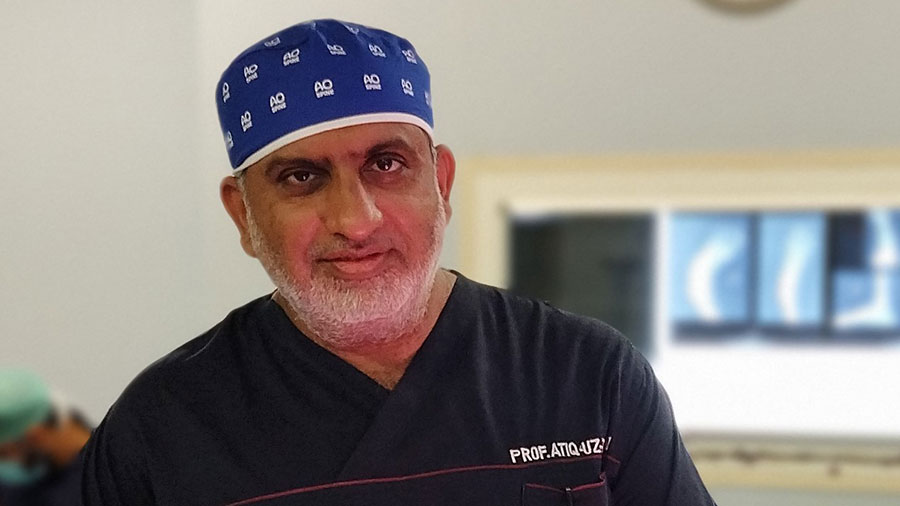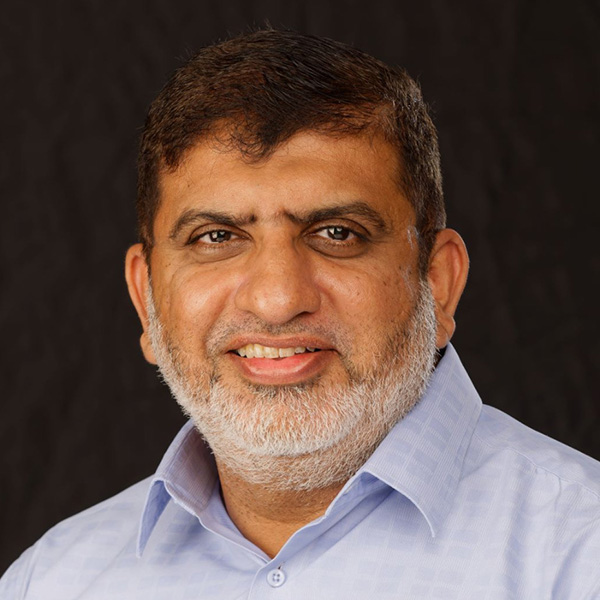Cultivating the next generation of leading spine surgeons
Chairperson Atiq Uz Zaman shines light on GSD Program’s global reach, systematic structure, and flexibility.

With applications for the Global Spine Diploma (GSD) Program 2024–2025 cohort now open, GSD Program Chairperson Atiq Uz Zaman discussed the value the internationally oriented, twelve-month online program brings to recently graduated orthopedic surgeons and neurosurgeons. In addition to his duties as a professor in the orthopedic and spine surgery department at Lahore (Pakistan) Medical and Dental College and at Ghurki Trust Teaching Hospital in Lahore, he has served the AO in several leadership positions over the past 19 years.
What was your pathway into spine surgery?
An orthopedic surgeon. I passed my fellowship examination in 2007 and then joined the Ghurki Trust Teaching Hospital, renowned for its expertise in spine surgery. Because there was a great need in Pakistan for spine surgeons, we built the current spine center at the Ghurki Trust Teaching Hospital, serving spine patients who are referred to us from all over the country. So I started doing spine surgery and, over time, our center added more and more procedures. Now, we do all aspects of spine surgery and this has become my passion and interest.
So, the spine center at your hospital genuinely answered a patient need.
Yes. When we started performing spine surgery, many implants were not available in Pakistan so we had to modify our methods, using orthopedic instruments for doing fixation in trauma and emergency surgeries. AO Spine helped us a lot in developing new techniques and supporting the introduction of implants to Pakistan.
How did you become involved in the AO?
In 2005, a friend informed me about AO’s new clinical division, AO Spine. Given our shared commitment to spine surgery at a pioneering unit in my country, we swiftly decided to join. I was the third person in Pakistan to join AO Spine. The first was my mentor, Prof Amer Aziz and the second was my friend, Prof Rizwan Akram.
How has AO Spine supported your own training as a surgeon?
AO Spine has played a pivotal role. My involvement with AO Spine courses as both a participant and faculty member has granted me access to a wealth of learning materials and resources. AO Spine courses have been instrumental in refining my research skills, providing a dynamic platform for participating in numerous multi-center studies. The organization has also been critical in cultivating my professional development and introducing me to a global community of spine professionals. As AO F aculty and chairperson of education programs , I was inspired to pursue a master’s degree in medical education. This journey has granted me the privilege of serving as the education officer on the AO Spine Middle Eastern and Northern Africa (MENA) board, and actively shaping the GSD Program since its earliest stages.
How did you become involved in the GSD Program?
As the education officer on the MENA board (2017–2020), I sat on the AO Spine Education Commission (AO SEC), when the AO SEC embarked on the strategic initiative of systematizing AO Spine’s educational assets. This vision prompted the establishment of the GSD Curriculum Task Force in 2018. As member of the task force and subsequently chair of the infection module (2021-2023) and now chairperson of the Program (2024–26), I have been dedicated to the GSD Program since its beginning.

“The GSD is not just a program; it is a gateway to continuous professional growth and excellence in the ever-evolving field of spine surgery.”
Atiq Uz Zaman, GSD Program Chairperson
Can you tell us more how the GSD Program helps spine surgeons? What can they expect to gain from it?
With its global reach and flexibility, the GSD Program is an invaluable resource for spine surgeons. It consolidates crucial, pertinent, and cutting-edge learning materials sourced from AO Spine, a globally recognized leader in education and research within the field. The meticulously structured program offers spine surgeons the unique opportunity to amass comprehensive knowledge about managing patients with spinal disorders over the course of a year, while requiring only a modest time commitment of a few hours per week.
What is absolutely unique in the world and special about the GSD Program?
What distinguishes the GSD Program is not just its outstanding learning resources but also the continuous access to a cadre of expert faculty members from around the world. GSD Program participants enjoy the unique privilege of posing questions directly to faculty, participating in lively discussions on controversial topics, delving into treatments from global perspectives, and actively engaging in online case discussions. This immersive and interactive learning environment ensures that participants not only acquire knowledge but also gain valuable practical insights and perspectives from seasoned professionals around the world.
A vast international team has been instrumental in crafting this diploma program. The curriculum has benefited from insights provided by a team of spine surgeons, while educational webinars and videos are curated by esteemed faculty members from around the globe. Additionally, the expertise of the AO Spine Knowledge Forums (KFs) and Global Spine Journal has ensured that the program remains up to date. In essence, it's not just the GSD team, but numerous AO Spine opinion leaders, researchers, and educators who have contributed to and continue to refine this initiative.
Focus often is on hands-on, on-site training, but there are also great opportunities for asynchronous and online learning/teaching in surgery. What can you tell us about these opportunities?
Knowledge forms the bedrock of skill development, the cornerstone upon which expertise is built. Understanding, analysis, application, and creativity: all contribute to refining a surgeon's capabilities. Asynchronous and online learning platforms are especially beneficial for surgeons. By providing flexible learning opportunities, these platforms facilitate continuous professional growth, enabling surgeons to stay abreast of the latest advancements, refine their skills, and adapt to evolving practices. This adaptability is key to ensuring that surgeons remain at the forefront of their field, delivering the highest standard of care to their patients.
What is your advice for young surgeons?
Firstly, I would stress that learning is a profound transformation in behavior, encompassing the assimilation of knowledge, the refinement of skills, and the cultivation of a positive attitude. I strongly advocate for the acquisition of comprehensive knowledge and the conduct of thorough research before embarking on any surgical procedure. The success of any skill is intricately tied to a solid foundational knowledge base. Secondly, I would encourage them to share their knowledge and skills with colleagues. By fostering a collaborative environment where information is exchanged freely, we not only enhance our individual capabilities but actively contribute to society by collectively elevating the standards of our profession, striving to better patient care and advancing the field. Most importantly, I urge aspiring surgeons to identify and nurture their passion thereby laying the cornerstone for forging a pathway to a prosperous and fulfilling professional life.

